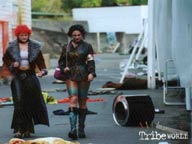 In the Tribe, the Mall Rats are forced into a situation where they live together and rely heavily upon each other. When they move in together, each Mall Rat is bonded, in a way, by an unwritten code. Each has certain responsibilities to fulfil. All are expected to help and give support to each other.
In the Tribe, the Mall Rats are forced into a situation where they live together and rely heavily upon each other. When they move in together, each Mall Rat is bonded, in a way, by an unwritten code. Each has certain responsibilities to fulfil. All are expected to help and give support to each other.
Many of you may be in the situation of thinking about moving away from home in the next few years. It is likely that you will move into a flat or apartment. As in the example of the Mall Rats, everybody in a flatting situation must fulfil responsibilities unless the situation simply collapses. This week, we look at some tips for living with your peers and the responsibilities that come with the situation.
Your situation at the moment
If you are living at home, responsibilities are often shared amongst the family – with many of the major decisions being undertaken by caregivers. Families differ in the amount of responsibility bestowed upon dependants.
Although it might sound unappealing, it is a good idea to get involved in different jobs around the house, as it gives you some real life skills before you are actually put in a true state of independence. Any help, of course, will also be appreciated by other family members.
The caregiver is usually the main provider of moral support in the family. Of course this all changes in a flatting situation, when people are more reliant on their flatmates and roommates to help them out.
 What responsibilities do you have around the house at the moment?
What responsibilities do you have around the house at the moment?
In what way would your responsibilities change if you decided to leave home and find an apartment?
In what areas do you think you could hone your skills in preparation for flatting?
Moving out of home can be a major step and its one that we all have to face sooner or later. The advantages of living with others in an apartment can include increased independence, developing confidence and skills as well as a fun and social time.
Disadvantages include cost, sometimes-difficult living conditions, and possible fallouts with friends.
Responsibilities
To get things done in a flat, everybody needs to take their share of responsibility.
Taking responsibility requires a fair degree of pro-activity. In the Tribe, characters have to go looking for what needs to be done – it is unlikely that anybody will chase them up to do tasks.
Often a lack of pro- activity can cause problems in flats – especially if tenants have been used to having their parents do everything for them. This is why good communication between flatmates is vital, so those problems can be ironed out early. Tolerance among flatmates is also important in these situations.
In the Tribe, certain characters take on particular specific responsibilities – separate from domestic chores. An obvious example would be Patch, who becomes the person in charge of first aid. This is fitting because he has an interest in this area. Much the same may happen in a flatting situation. One person may put himself or herself in charge of basic maintenance, for instance, if they have a strength or interest in that area.
Choosing a place
The Mall Rats considered the Mall a good place to stay as it fitted their particular needs. It was relatively warm and comfortable as well as close to the market and amenities.
Unlike the Mall Rats who were seen roving around town looking for a spare shopping mall, most of us start with the classified section of the paper or get wind of a place through acquaintance. Here are some factors that need to be considered when choosing a place to live.
Cost is usually a big factor to consider when you first move out of home. Expenses are inevitably more than what you first think. Don’t forget that most landlords will expect a number of weeks’ rent in advance and a bond to be paid before you move in.
Remember also that there are hidden costs that you may not consider to begin with such as electricity and telephone.
Comfort is important as is finding a place that is healthy and safe e.g. bottom floor flats can often be damp.
You need to consider access to the apartment as well. Have you got transport? Is the place on a public transport route? Is there parking nearby?
Finding a decent flat in some towns can be tricky and I know that it is a luxury to be choosy. But don’t just take the first flat that presents itself without carefully considering all the factors.
Finding flat mates
When looking for a flat, you need to ask yourself what kind of person are you happy to live with. They need to be people that are reasonably compatible with your chosen life style. It is no good choosing somebody who is going to play electric guitar solos until 3am if you need to get up at the crack of dawn for lectures. Make sure the people have similar tastes etc. so that you can put up with their habits and visa versa. Flatting with people that you know can have both disadvantages and advantages. It has been known to put strain on friendships as people realise the faults that they had noticed from afar. On the flip side, you may trust friends more than strangers. Whether the flat actually works out often comes down to the individuals, their personalities and their meeting of responsibilities.
 Getting organised
Getting organised
If you are living in a situation with your peers, it is usual to do some organising as a team. Communication is vital. Everybody needs to be consulted if a decision is to be made.
When people first move in, arrangements regarding paying of bills should be set up and a system put into place to ensure that such obligations are met by all. Everybody needs to be aware of the tenancy agreement and the part they have to play (they may be expected to stay for a certain period of time, give a certain amount of notice to leave etc) Often a roster is drawn up. This deals with cleaning, shopping, cooking and other domestic tasks. Some flatmates may decide to Œrow their own boat’ when it comes to cooking, for example, but this needs to be made quite clear from the start.
Other important questions to ask when looking at apartments
- Is the apartment furnished – where will you get furniture from?
- Are you allowed pets?
- How far are you from supermarkets and public amenities?
- Have you got a study area if you need one?
- Are you relaxed and comfortable in your environment?
- Do you have white wear – stove, fridge, freezer, washing machine etc.
- Does it fit with any special health requirements that you have e.g. asthma, allergies?
With flatting comes a steep learning curve along with a number of great experiences. It is a good idea to be prepared for the big move and to have considered some of the issues first.

